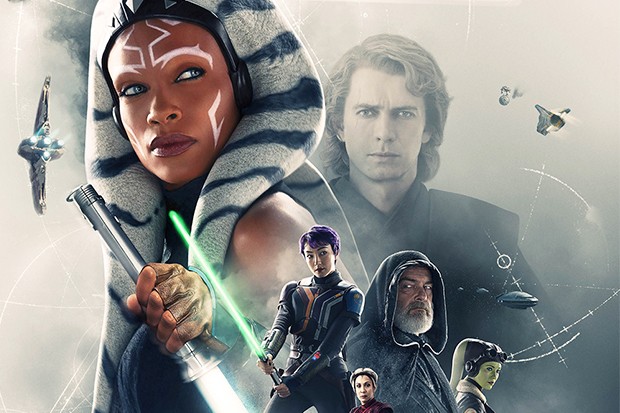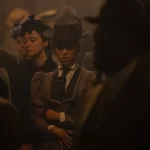Rebels and The Clone Wars were both watershed moments. They introduced Star Wars to the animated medium, delivering impactful stories in a fresh new format. Despite their younger intended audience, both of these shows ended with painful, bittersweet finales.
These shows, being the first SW TV shows (discounting Ewoks, of course), paved the way for a different era of SW content. The Mandalorian has been hailed (rightfully so) as one of the best Lucasfilm productions in recent years. But TCW and Rebels paved its way to greatness.
Also, Rebels just means so much to me personally. I watched it during my first year at college, still emotionally damaged from TROS, and Rebels reopened Star Wars to me. Suddenly, despite my grief at the ending of the Skywalker Saga, here were new characters and storylines to attach myself to with fervor. In the two years after I first found it, I rewatched Rebels three times.
And now, over fifteen years after her debut in The Clone Wars movie, one of the stars of the SW animated universe finally has a show of her own. But Ahsoka was always supposed to be about more than just this singular character – it was a continuation of one of the most devasting pieces of media in SW history.
Was the beauty of Rebels done justice in Ahsoka? What about Ahsoka herself?
Ahsoka as a nostalgia garden
The first two episodes were a beautiful tribute to Rebels. Ezra’s original “I’m counting on you” line was wonderfully referenced twice. Episode 5, despite not having a clear message, was cinematic and emotional. Also, we finally got to see Jacen! And Hera, and Sabine, and Ezra, and Chopper – they were all so well-portrayed in their first live-action appearances. And, of course, Rosario Dawson is a brilliant Ahsoka.
I just wish they gave her more to work with.
Ahsoka is one of the most legendary SW characters there is, if not the most. Her presence across SW history, the role she plays in such powerful moments, the connections she’s formed in her lifetime – there isn’t a fan alive who doesn’t know her name.
Naturally, clamor for her own show has been widespread for years. And given that this call was answered and combined with a direct sequel to Rebels, the potential was off the charts for a miniseries just as compelling as the titular character.
Ahsoka gave us a version of her we’d never seen before. Unlike The Clone Wars or Tales of the Jedi, Ahsoka showed us our favorite ex-Jedi at her oldest point. This Ahsoka has fought through the Clone Wars, watched the rise and fall of the Empire, and aided in the Rebellion. She’s dueled Maul, killed Inquisitors, and faced Vader. So now, in her mid-forties – what’s next? What goal is she chasing now? What cause is she supporting? And how have all of her life experiences affected and changed her?
As visually beautiful as it was, and for all the great parts I mentioned above, Ahsoka disappoints its most die-hard fans. Frustratingly, this show was played incredibly safe.
(I wish this had been a series I could show my mom. One where, even if she’s never seen TCW or Rebels, she’d be able to follow the plot and become attached to the characters. Their rises and falls could’ve felt significant in a way separate from their source material. The arcs Ahsoka and Sabine undertook could’ve held emotional weight even to an outsider. Instead, the show remains accessible and enjoyable only to the most devoted of SW fans.)
Ahsoka as a Rebels follow-up
In its purest form, Ahsoka is a direct sequel to Rebels. You can’t watch one without the other. The connected story is the entire plotline of Ahsoka. The heartbreaking open ending of Rebels has finally been properly concluded – Ezra is home – but that doesn’t mean we’ve reached the last page of anyone’s adventures yet.
However, despite her impactful presence on the show, Ahsoka was never a protagonist of Rebels. Those roles always fell to the Ghost crew – Kanan, Hera, Ezra, Sabine, Zeb, and Chopper. Before Ahsoka’s introduction and after her disappearance, these characters continued to fight and bond and function together. And yet Rebels’ follow-up bears Ahsoka’s name.
So what has this meant for Ahsoka? We’ve always known this would be her show, but it’s also heavily focused on a pre-existing storyline not entirely connected to her. Even before its release, Ahsoka always had two tasks to fulfill: saving Ezra and saving Ahsoka.
Ezra’s salvation was always the easier of the two. The solution to his predicament was simple: find him. Bring him home. But what about Ahsoka? What was the reason for her to be the star of this show, rather than Sabine? What emotional journey did Ahsoka need to undertake during these eight episodes?
Ahsoka as a character exploration
In Obi-Wan Kenobi, the titular character had both emotional and physical arcs to conquer across his show. The physical one was simple: protect young Leia and return her to her family. But Obi-Wan’s emotional journey was far more arduous: he had to learn the truth about Vader and come to terms with his former friend’s new identity. Both of these arcs were wonderfully delivered. And the obvious link between them – Obi-Wan saving Leia while acknowledging he cannot save Anakin – made the two story threads weave together beautifully.
However, in Ahsoka, she never has a true emotional arc. Her journey is unspecific and ill-defined. She begins the show with the same personality and characteristics as we see at the end. An argument could be made that her confrontation with Anakin in episode 5 is her turning point, but what she gained from it is frustratingly unclear. If it was an acknowledgment of her own dark side potential, then it’s coming out of nowhere and not given enough airtime. If it was about her coming to terms with who Anakin was, similar to Obi-Wan in his show, then it’s an underdeveloped concept. In Obi-Wan Kenobi, Anakin was discussed in nearly every episode. In Ahsoka, far less screentime was given to reflections on her former master. And if her arc in episode 5 was solely about Anakin, it’d be a disappointing turning point for Ahsoka’s own show.
The presences of “Ahsoka the White” and “Ahsoka the Grey” have been examined by SW fans many a time. While we see Ahsoka redon her white cloak at the end of episode 5, I’m still left wondering why she made this choice. It could’ve been linked solely to her seeing Anakin again, but what exactly did he give her that she didn’t have before?
The lost potential embitters me the most.
Ahsoka NOT as a villain arc
More than once, the show tried to bring up Ahsoka’s hidden dark side. If she was once the apprentice of Darth Vader, does that mean darkness is inside of her as well? Thrawn implies this in the finale, telling Ahsoka “one wonders just how similar [she] might become” to Anakin. But this is a last stab at a weakly explored premise. It only came up once before, in episode 5.
Ahsoka and Anakin dueled in that episode. At the end, when Ahsoka gained the upper hand, her eyes briefly flashed yellow with the dark side. But she openly disavowed taking the same path as Anakin, tossing aside her lightsaber and embracing the light side. Anakin’s last line to her, “There’s hope for you yet,” seemed to imply she would not be following his path. But when has Ahsoka ever been swayed in this direction? In all of her time in TCW, Rebels, and her own book, Ahsoka has never even glanced in the direction of the dark side.
That is how this show could’ve made SW history. If it had delved into Ahsoka’s dark side – truly explored it, not just vaguely hinted – we could’ve been given a brand-new side of this character. After all, we’ve never seen Ahsoka post-Malachor, except for the Rebels episode “The World Between Worlds.” This was uncharted territory for her – it’s a shame such a predictable map was used for her journey.
In terms of a Rebels sequel, Ahsoka fulfills that long-awaited promise from season 4. Ezra is home. But in terms of an emotional arc, Ahsoka fails to deliver. This is one of the greatest characters ever created in all of Star Wars. The potential for her show was abundant, but it fell prey to SW’s current fear of taking bold strokes.
We’re being told that a second season of Ahsoka is on the distant horizon. There’s a chance that the undiscussed elements of the first season could be explored more deeply, but I’m not holding my breath. Ahsoka missed its chance to do something extraordinary. At least Ahsoka’s character didn’t lose anything in this show – but she didn’t gain anything either.



